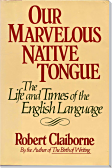

| Book of the Month | ||
 |
Our Marvelous Native Tongue |  |
Publisher: Times Books
Author: Robert Clairborne
$19.95
ISBN 978-0812910384
Even native users occasionally get frustrated with the English language. If the plural of 'house' is 'houses' why should the plural of 'mouse' be 'mice'? And why does 'quite' mean 'somewhat' and also 'exactly'? There are hundreds of such strange quirks in English, and author Robert Clairborne does a good job of explaining many of them in a book which he himself describes as 'a love letter to the English language'. For this author, the many odd twists and turns that English has taken over the centuries makes English fascinating rather than frustrating. (Do you know that 'midwife' comes an old English word for 'collaborator' and originally had nothing to do with wives or childbirth?) English is perhaps the richest and most expressive language on the planet, and this book explains - with many examples - how this happened.
The book is basically a history of the English language in eleven chapters, but this excludes the first chapter entitled 'The importance of speaking English'. Here the author explains what every English language student knows. English is the second language of the world; there are more English-speakers with a different mother tongue than there are native English speakers. He also makes other points – for example one of the problems with English vocabulary is the use of the same word for very different things. For example is 'crook' one word or several, since a 'crook' is a verb meaning 'to bend', and also a criminal and a shepherd's staff? So when counting the number of words in the language, is 'crook' one or three? He also points out that many 'English' words which - for example - the French say is polluting their language came originally into English from France.
In the main body of the book we follow the development of English from its Indo-European origins thousands of years ago all the way to its use in the modern world. Indeed the final chapter is 'English Today and Tomorrow', in which the author complains about sloppy English uses and bad educational practices and is generally pessimistic about the development of the language. Oddly enough he seems unaware that in earlier chapters he reported people saying the same about English in the time of Shakespeare and Chaucer. Perhaps the two best features of this book are firstly that it shows how English developed from the language of a small population in south-eastern England to being spoken by somewhere around a billion people today, and some fascinating word origins. (For example, names like Harrowgate and Westgate and indeed Watergate have nothing to do with 'gates' but come from the Norse gata meaning 'road'. As some readers might have noticed from the spelling of the book's title, the author is American, and many of his examples and quotes come from the USA.
Who is this book for? This is certainly not a book for English learners, since the grammar and vocabulary are advanced. However if you are the kind of person who learns words more easily if you know the origin this book will help. (The author explains he became fascinated with words when he discovered that 'siege' means 'sit' in French, and 'siege' has its meaning in English because the army sits around a city it is attacking.) Certainly every teacher should read this book, not only because it has some strong opinions on how English should be taught, but because it is full of little details about the history of English which will make lessons more interesting.
Verdict: The history of English and more
Assessment 6/10